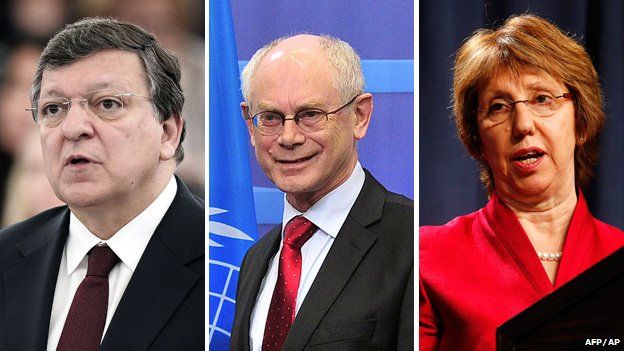European elections: Race for EU top jobs
- Published

The coming months will see big leadership changes in the EU. The bloc's most famous faces - EU Commission President Jose Manuel Barroso, European Council President Herman Van Rompuy and foreign policy chief Catherine Ashton - are all ending five-year terms, though who will replace them is not clear.
Of the three posts the most powerful is Commission president, running the Brussels bureaucracy which drafts EU laws and enforces compliance with EU treaties.
Will the new leaders be elected?
No. Although elections are being held in May for the European Parliament, none of these posts is subject to direct public vote.
However, the elections may have an influence. For the first time the 28 EU national prime ministers and presidents - the European Council - will have to "take into account" the election result when choosing who they want to be Commission president. That is stipulated by the Lisbon Treaty.
And for the first time the European Parliament will vote on the leaders' nominee. So their first choice could be rejected by MEPs. The newly-elected MEPs will hold their vote in mid-July.
Once a new Commission president is in place he or she will have to pick a new team of commissioners. In the past the Commission has broadly reflected the post-election political balance across the EU. Many centre-right governments were in power in 2009 - and 13 of the current 28 EU commissioners are also centre-right.
The European Council president and foreign affairs chief will be decided by the European Council.
How the European Commission works
Who is in the running?
The biggest political groups in Europe have nominated candidates for Commission president. The three campaigning for the centre-right, centre-left and liberals are all veterans of EU politics and all "federalist", in the sense that they want a tightly integrated EU with more powers.
The centre-right European People's Party (EPP) has put forward Jean-Claude Juncker, former chair of the eurozone finance ministers and former Luxembourg prime minister.
The centre-left Socialists and Democrats (S&D) bloc has Martin Schulz, a German MEP who is outgoing European Parliament president.
The liberal ALDE bloc has chosen Guy Verhofstadt, an MEP and former Belgian prime minister.
They are holding several televised debates - of which the one on 15 May looks set to be the biggest event, hosted by the European Broadcasting Union.
The Greens have two top candidates - French farmers' champion Jose Bove and Ska Keller from Germany.
The head of Greece's powerful left-wing opposition Syriza bloc, Alexis Tsipras, is the candidate of the European Left.
The field is still wide open, however. Few back in 2009 expected Mr Van Rompuy and Baroness Ashton to get such senior EU posts. There is speculation that if Mr Juncker does not become Commission president, he may instead replace Mr Van Rompuy as European Council president.
Will there be much dispute?
There is a strong possibility, especially if the election produces a tight result, that the biggest blocs will fight hard over the identity of the nominees. A recent opinion poll suggests that outcome. So hammering out a compromise could take time.
Some commentators doubt that Germany's Chancellor Angela Merkel, of the centre-right, would accept Mr Schulz as Commission president. UK Prime Minister David Cameron might also oppose Mr Schulz - in which case a consolation prize for him might be the foreign policy job.
But Polish Foreign Minister Radek Sikorski - prominent in the EU's handling of the Ukraine crisis - is seen as a strong contender to replace Baroness Ashton.
Commentators have suggested various "dark horse" candidates to head the Commission, such as Danish Prime Minister Helle Thorning-Schmidt, her Irish counterpart Enda Kenny, or Italy's former Prime Minister Mario Monti, a Brussels veteran.
Eurosceptics are widely expected to boost their numbers in the European Parliament and could make it harder to reach consensus on the next Commission line-up.
Across the EU there could be much grumbling about the choices, as many voters still feel remote from EU politics and cannot name the leaders who wield considerable power in Brussels.
How the European Parliament works
When will we know who's won?
In September each new commissioner will have to be vetted by MEPs - in the past they have rejected some nominees.
The national governments each put forward one candidate for commissioner. There is always intense rivalry over the key portfolios, such as internal market, the economy, trade, justice and home affairs. The new team should take office in early November.
Later in November the European Council will choose the successor to its president Herman Van Rompuy, as well as a new foreign policy chief (officially called High Representative) to replace Baroness Ashton. Currently she is also the UK's appointee to the Commission.
- Published25 February 2014
- Published21 April 2014